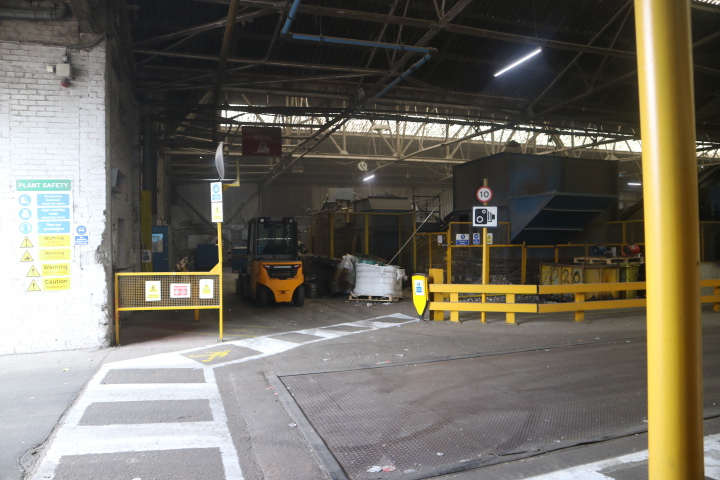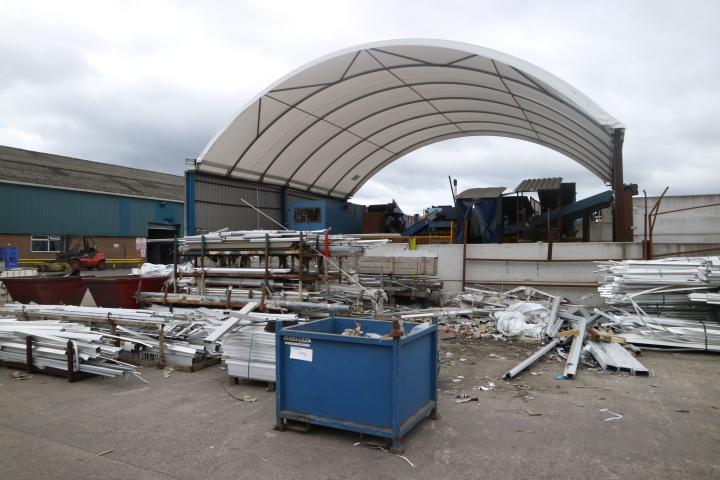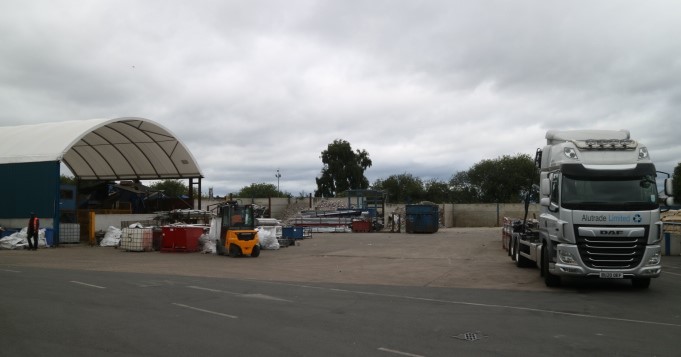Stuart Towns, 35, suffered serious head injuries after being struck from above while working at Alutrade’s site on Tat Bank Road, Oldbury, in July 2017 and died at the scene.
After admitting corporate manslaughter, Alutrade was fined more than £2 million at Wolverhampton Crown Court in March. Three members of senior management were also fined after pleading guilty to breaches of the Health and Safety at Work Act (see letsrecycle.com story).

Andrew Powell, director at Alutrade, told letsrecycle.com that, following the accident, the company had installed signage across the site, two-metre fences around every piece of plant and zebra crossing-style walkways to segregate pedestrians and vehicles.
Alutrade recently spent “the best part of £80,000” on retarmacking, Mr Powell said, and “hundreds of thousands” on repairing concrete infrastructure.
Staff now regularly undertake refresher health and safety training because “they’ve also got their own responsibility towards that themselves”.
“Everything now is done with health and safety first and everything else second, profitability or whatever it might be,” Mr Powell said.
‘Key personnel’
Another key aspect of Alutrade’s plan to improve standards of health and safety was to bring in “key personnel”. Alongside a dedicated transport manager, Alutrade hired John Thompson as a dedicated health and safety manager shortly after the accident.
Previously, Mark Redfern, who is still with the company after being fined more than £15,000 for his part in the incident, was environment and health and safety manager.
“It was too much on for him,” Mr Powell said. “So, John has taken a dedicated health and safety role.”
ISO 45001
Among Mr Thompson’s priorities on taking the role was to achieve the British Standards Institution’s ISO 45001 standard, which specifies requirements for an occupational health and safety management system and requires auditing by an external body.

“As far as I was concerned, we wanted to be a leader within industry safety,” Mr Thompson said. “With the 45001, if you look at the scope of that standard, there’s a lot of emphasis on the drive from a senior management point of view. They’ve got an input.
“That helped the culture change because you’ve got the senior management involved. When you look at the transition to the 45001, we’ve seen the buy-in very quickly.
“Yes, you’ve got to be quite forceful at the very beginning. It’s not friendly, but you have to because you’re changing things completely.”
Mr Thompson says Alutrade allowed him to implement all the changes he believed were necessary. “Everything that I sat down and went through with the board of directors that I believed that we needed to do, we’ve done,” he said.
“Money wasn’t the issue. The key was to try and make sure that it was right and that our systems were in place.”
‘Biffa Line’
The Health and Safety Executive visited Alutrade in 2015 and issued the company with a contravention notice due to the absence of gates on the so-called ‘Biffa Line’, according to the Crown Prosecution Service (CPS).

By 2017, the newly installed gates were “damaged”, the CPS says, and did not prevent Mr Towns from climbing underneath the machinery.
The Biffa Line pre-sorted residual waste from Biffa – hence the name – and other clients such as AmeyCespa, to “take out the majority of the waste and leave can products, which we then put through our can shredding facility.”
In 2017, Alutrade was getting “tons and tons and tons” of material, Mr Powell says, and so decided to install a larger machine. “In 2017, we were in the process of final commissioning of that machine when the accident happened,” Mr Powell said.
Alutrade is looking to upgrade the line again. “We’ve got some trials next week with some new sorting technology which will reduce the size, reduce the number of conveyors, the number of moving parts,” Mr Powell said. “[Material] is literally put it in one end, it comes out the other end.”
Mr Powell said the new line would be “intrinsically” safer than the old Biffa Line “There’s less to go wrong on it,” he said. “There are fewer people working there. There are fewer moving parts to it.”
Aluminium
Established in 1987, Alutrade describes itself as “the largest and most established aluminium recycling company and extrusion specialist in the UK”.
On average, the company says, it recycles around 30,000 tonnes of metal every year, including 10,000 tonnes of cans, equating to approximately 670 million individual containers.
Alutrade claims it recycled a third of all the cans produced in the UK in 2010.












Subscribe for free